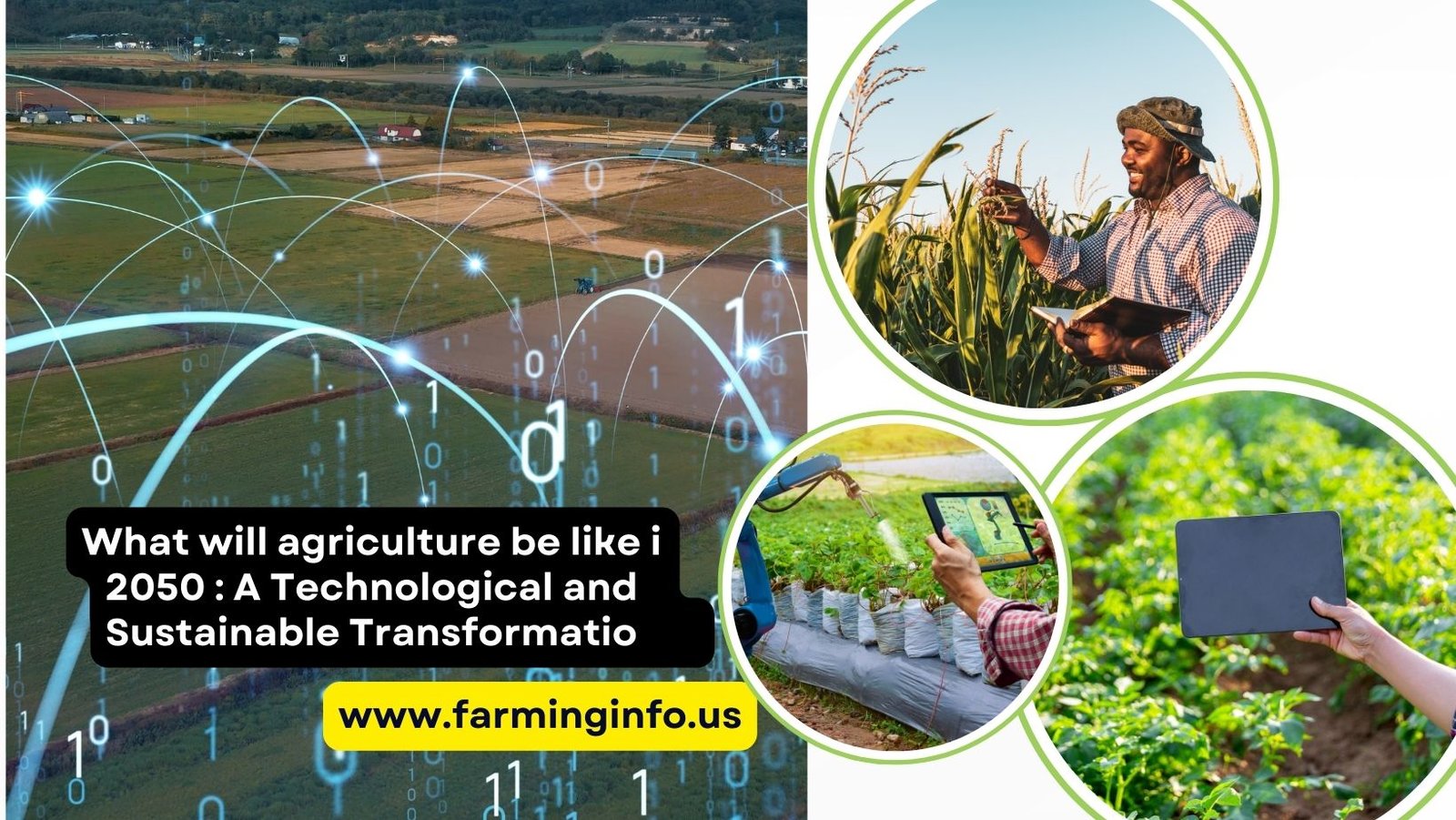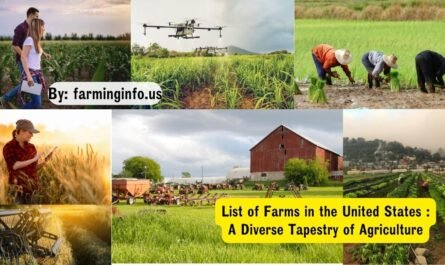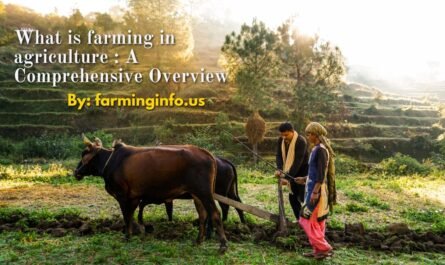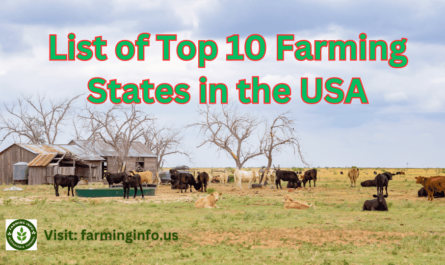The agriculture industry is on the brink of a profound transformation as we look ahead to the year 2050. With advancements in technology, shifts in consumer preferences, and the looming challenges of climate change and population growth, agriculture in 2050 will bear little resemblance to its current form.
In this blog post, we’ll explore the potential landscape of agriculture in 2050 and how it might be shaped by innovation, sustainability, and resilience.

1. Technological Advancements:
Technology will play a central role in shaping the future of agriculture. From precision farming techniques to the use of artificial intelligence (AI) and robotics, farmers will have access to a suite of tools to enhance productivity and efficiency.
Drones equipped with multispectral imaging will monitor crop health, while autonomous tractors and harvesters will revolutionize labor-intensive tasks. The Internet of Things (IoT) will connect farm equipment and sensors, providing real-time data on soil moisture, temperature, and nutrient levels.
2. Precision Agriculture:
Precision agriculture will become the norm, leveraging IoT sensors, drones, and satellite imagery to monitor crop health, soil conditions, and weather patterns in real-time.
Farmers will have access to actionable insights, enabling them to optimize resource use, minimize environmental impact, and maximize yields with pinpoint accuracy.
3. Automated Farming:
Robotics and autonomous machinery will revolutionize farm operations, from planting and harvesting to irrigation and pest control. Automated systems will streamline labor-intensive tasks, improve efficiency, and reduce reliance on manual labor.
Robotic harvesters, weeders, and drones equipped with AI algorithms will work collaboratively to increase productivity while reducing costs.
4. Sustainable Practices:
Sustainability will be a guiding principle in agriculture 2050. Farmers will adopt regenerative farming practices aimed at restoring soil health, conserving water, and promoting biodiversity. Agroforestry, cover cropping, and organic farming methods will become more prevalent as farmers strive to minimize their environmental footprint.
Additionally, renewable energy sources such as solar and wind power will power farms, reducing reliance on fossil fuels and mitigating greenhouse gas emissions.
5. Climate Resilience:
Climate change will present significant challenges to agriculture in 2050, including extreme weather events, shifting growing seasons, and water scarcity. In response, farmers will develop climate-resilient crop varieties through advanced breeding techniques and genetic engineering.
Drought-tolerant crops, heat-resistant varieties, and salt-tolerant strains will enable farmers to adapt to changing environmental conditions and maintain yields in the face of adversity.
6. Urban Agriculture:
With urbanization on the rise, agriculture will increasingly move closer to urban centers in the form of vertical farming, hydroponics, and rooftop gardens. Vertical farms housed in skyscrapers will utilize controlled environments and LED lighting to produce fresh produce year-round, reducing the need for long-distance transportation and conserving land.
Urban agriculture initiatives will promote food security, community engagement, and local economic development.
7. Digitalization and Connectivity:
The digital revolution will transform agriculture into a data-driven industry. Farmers will harness big data analytics, machine learning, and blockchain technology to optimize decision-making and enhance traceability throughout the supply chain.
Smart farming platforms will enable seamless communication and collaboration between farmers, suppliers, and consumers, fostering transparency, efficiency, and trust.
8. Internet of Things (IoT) and Smart Farming
The Internet of Things (IoT) will play a crucial role in the future of agriculture. By connecting devices, sensors, and machines to the internet, farmers will have access to real-time data and insights about their crops, soil conditions, and weather patterns.
This data-driven approach, known as smart farming, will enable farmers to make informed decisions and optimize resource allocation.
Smart farming will involve the use of drones and autonomous vehicles for crop monitoring and precision agriculture. These technologies will enable farmers to identify areas that require attention, such as pest infestations or nutrient deficiencies, and take targeted actions.
By reducing the need for manual labor and improving efficiency, IoT and smart farming will increase productivity while minimizing environmental impact.
9. Genetic Engineering and Crop Improvement
Genetic engineering will continue to play a significant role in crop improvement in 2050. Scientists will develop genetically modified crops that are resistant to pests, diseases, and extreme weather conditions. These crops will have increased yields, improved nutritional content, and enhanced tolerance to environmental stresses.
Genetic engineering will also enable the development of crops with reduced water and fertilizer requirements. By optimizing the genetic makeup of plants, farmers will be able to grow more food with fewer resources. This will not only increase food production but also contribute to sustainable farming practices.
10. Blockchain and Supply Chain Transparency
Blockchain technology will revolutionize the way we trace and verify the origin of food products. By creating a decentralized and transparent system, blockchain will enable consumers to track the entire journey of their food, from farm to table. This will ensure food safety, prevent fraud, and promote fair trade practices.
Blockchain will also facilitate the implementation of sustainable farming practices. Farmers will be able to record and share data about their farming methods, environmental impact, and social responsibility. This transparency will drive accountability and encourage the adoption of sustainable practices throughout the agricultural supply chain.
Conclusion
The agriculture industry of 2050 will be transformed by technological advancements and sustainable practices. The integration of IoT, robotics, genetic engineering, and blockchain will revolutionize the way we produce, distribute, and consume food.
With increased efficiency, productivity, and environmental consciousness, agriculture in 2050 will meet the growing global demand for food while preserving our planet for future generations.
Embracing this transformative vision of agriculture will not only ensure food security and economic prosperity but also foster a healthier and more sustainable future for generations to come.


